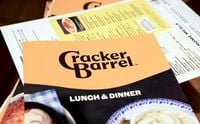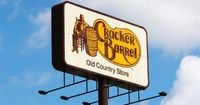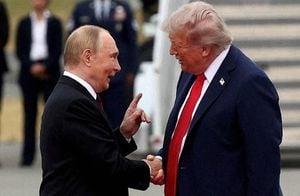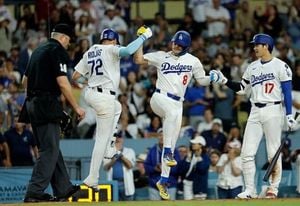Cracker Barrel, the Tennessee-based chain famed for its down-home comfort food and Americana décor, has found itself at the center of a cultural and corporate storm. In the span of just a few weeks, the company’s efforts to modernize—most notably, a controversial logo redesign and a quiet shift away from its public LGBT Pride support—sparked backlash from customers, activists, and even the brand’s own co-founder. The episode has left the company scrambling to reassure its loyal base while trying to chart a path forward in an era of changing expectations and fierce social debate.
The trouble began in mid-August 2025, when Cracker Barrel unveiled its first new logo in 48 years. Gone was the iconic “Old Timer”—the elderly man in overalls leaning on a barrel, affectionately known as Uncle Herschel. In his place stood a minimalist, text-only design. According to Today.com, the change was part of a broader $700 million modernization push, which also included plans to remodel 50 to 60 of the chain’s roughly 660 restaurants. The new look aimed to appeal to a younger generation of diners and bring a fresh feel to the brand’s image.
But the reaction was swift—and overwhelmingly negative. Longtime fans of Cracker Barrel lit up social media with complaints, accusing the company of abandoning its roots. The backlash wasn’t limited to the logo. News soon broke that Cracker Barrel had quietly removed its LGBT Pride page from its website, renaming its “Culture & Inclusion” section to “Culture & Belonging.” The move, first reported by Fox News and Faithwire, came amid pressure from conservative activists who had criticized the company for participating in LGBT-themed initiatives, including sponsoring the 2024 Nashville Pride Parade and introducing rainbow-colored rocking chairs for Pride month.
Chris Rufo and Robby Starbuck, two prominent conservative commentators, hailed the removal of the Pride page as a "major victory." Starbuck went further, calling for Cracker Barrel to ensure its donations only support causes that "the majority of your customers find unifying" and to consolidate employee groups into a single, unified team. The company, for its part, said it had updated its business resource groups to focus all sponsorships and events on corporate giving initiatives—addressing food insecurity, supporting community needs through food, and reducing food waste.
Yet, the controversy didn’t end there. The logo change, in particular, hit the company’s bottom line hard. Within days, Cracker Barrel’s stock tumbled 14%, erasing about $100 million in brand value. The company acknowledged the blow, with a spokesperson telling Fox News, “We thank our guests for sharing your voices and love for Cracker Barrel. We said we would listen, and we have. Our new logo is going away, and our ‘Old Timer’ will remain.” The statement emphasized that the chain’s core values—serving up delicious food, warm welcomes, and genuine country hospitality—had not changed.
On August 25, Cracker Barrel released a message on its website titled "Our Promise to You," directly addressing the uproar. “If the last few days have shown us anything, it’s how deeply care about Cracker Barrel,” the company wrote. “We’re truly grateful for your heartfelt voices. You’ve also shown us that we could’ve done a better job sharing who we are and who we’ll always be.” The statement sought to reassure fans that beloved traditions—rocking chairs on the porch, a warm fire in the hearth, peg games on the table, unique treasures in the gift shop, and vintage Americana—were not going anywhere. “Uncle Herschel will still be on our menu, on our road signs and featured in our country store. He’s not going anywhere — he’s family.”
Despite the conciliatory tone, the episode has exposed deep divisions over the direction of the brand. Tommy Lowe, the 93-year-old co-founder of Cracker Barrel, weighed in with stinging criticism. Speaking to reporters, Lowe dismissed the new logo as “pitiful” and questioned whether CEO Julie Felss Masino truly understood the chain’s “country” identity. He argued that the company had no real competition and should focus on food and service, rather than chasing trends or trying to compete with other chains. Lowe warned that failing to maintain the brand’s country essence could jeopardize the business itself.
Cracker Barrel’s complicated relationship with social issues is nothing new. Back in 1991, the company’s corporate policy stated that any employees who didn’t demonstrate “normal heterosexual values” would lose their jobs—a rule that led to the firing of 11 employees and nationwide protests, as reported by Fox News. Over the years, the company shifted toward a more inclusive stance, pulling all “Duck Dynasty” products from its stores in 2014 after controversial comments by Phil Robertson, and sponsoring Pride events in more recent years. The decision to quietly step back from public LGBT support in 2025, while not explicitly disavowing those values, has raised questions about whether Cracker Barrel is trying to thread the needle between competing cultural pressures—or simply avoid controversy altogether.
Even as the dust settles, the company is trying to strike a delicate balance. In its public statements, Cracker Barrel has emphasized that while the logo change and remodels may be “making headlines,” the chain is still focused on its food and the country hospitality that made it famous. “We know we won’t always get everything right the first time, but we’ll keep testing, learning, and listening to our guests and employees,” the company wrote. “At the end of the day, our promise is simple: you’ll always find comfort, community, and country hospitality here at Cracker Barrel. Uncle Herschel wouldn’t have wanted it any other way.”
Still, the episode has become something of a Rorschach test for the broader culture wars playing out in America. For some on the right, Cracker Barrel’s retreat from LGBT Pride and the restoration of the “Old Timer” logo are seen as victories for tradition and customer feedback. For others, the moves signal a troubling retreat from inclusivity and a capitulation to reactionary voices. And for many longtime fans, the entire episode has served as a reminder of how much the brand means to them—and how fiercely they’ll defend its traditions, even as the world around it changes.
As Cracker Barrel moves forward, the stakes couldn’t be higher. With its stock still recovering and its reputation on the line, the company faces a tough challenge: how to honor its storied past while staying relevant in a rapidly evolving cultural landscape. Whether it can pull off that balancing act remains to be seen, but one thing is certain—America will be watching, and so will Uncle Herschel.





